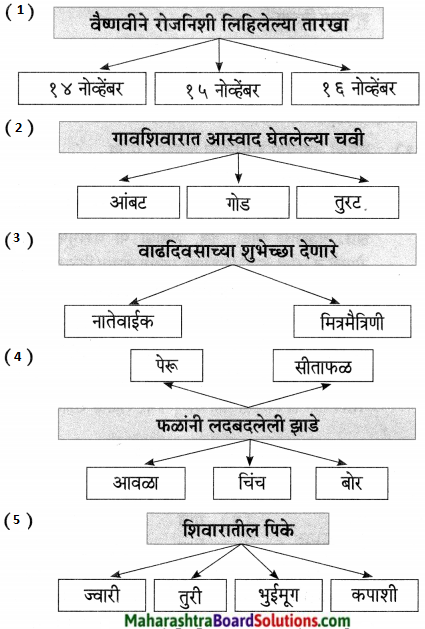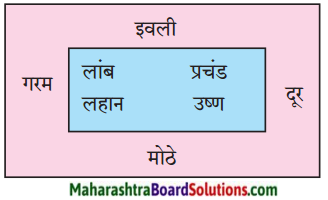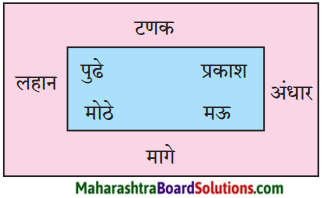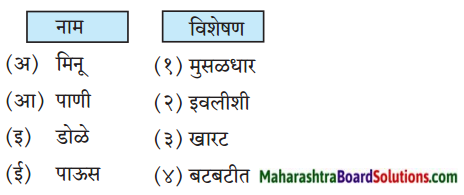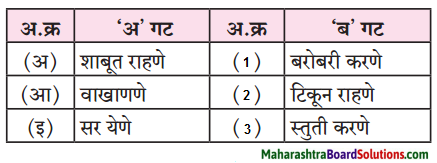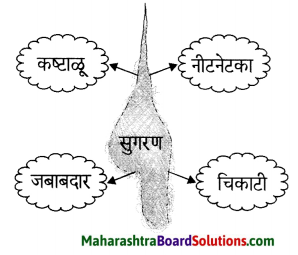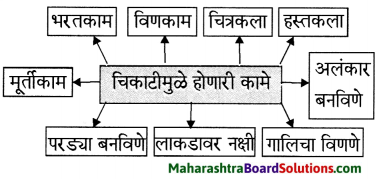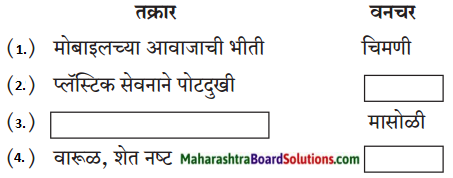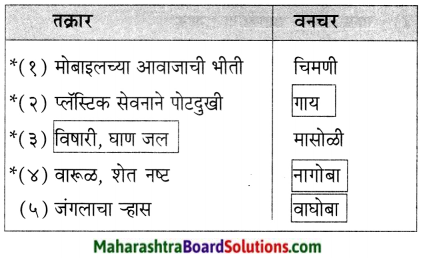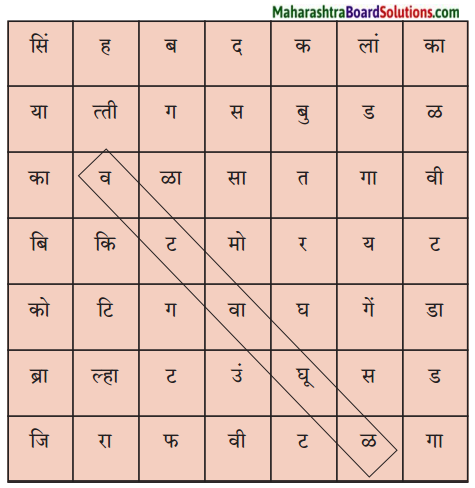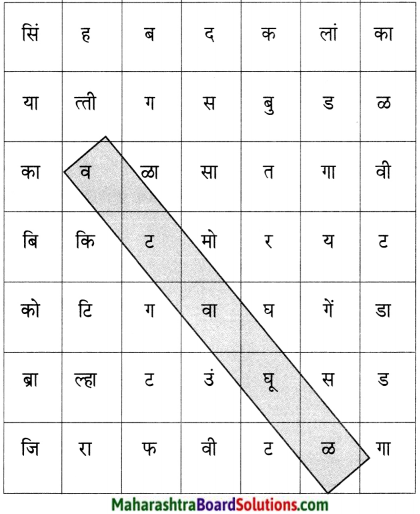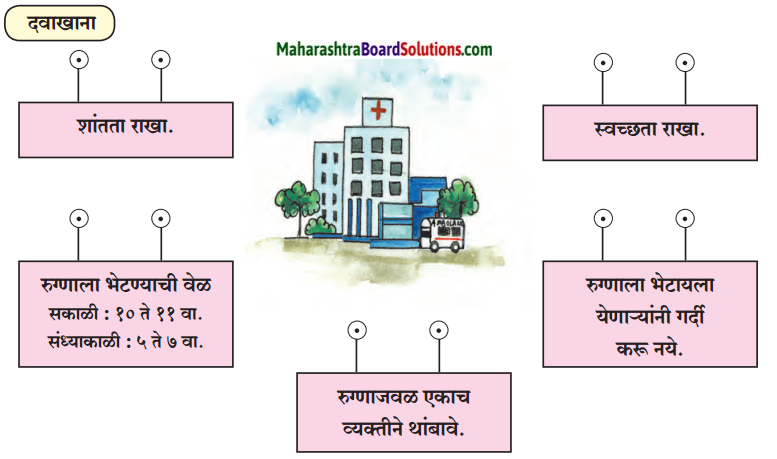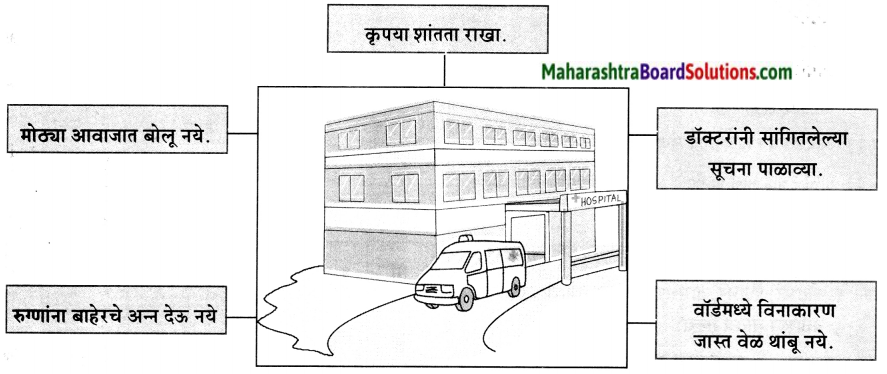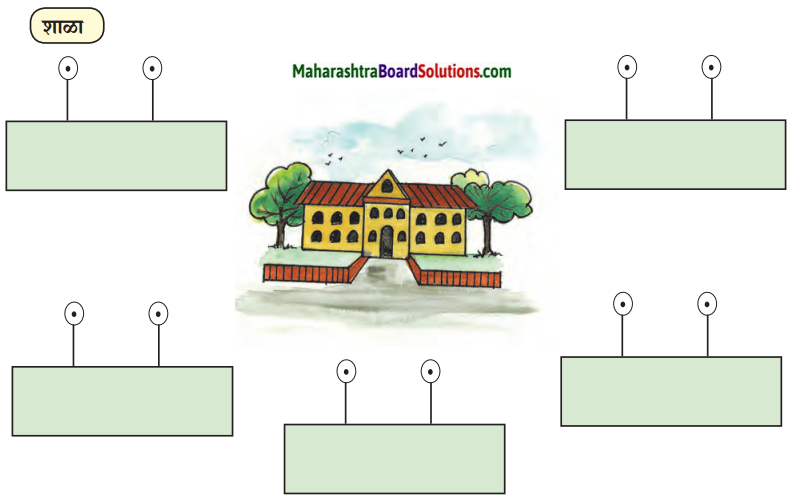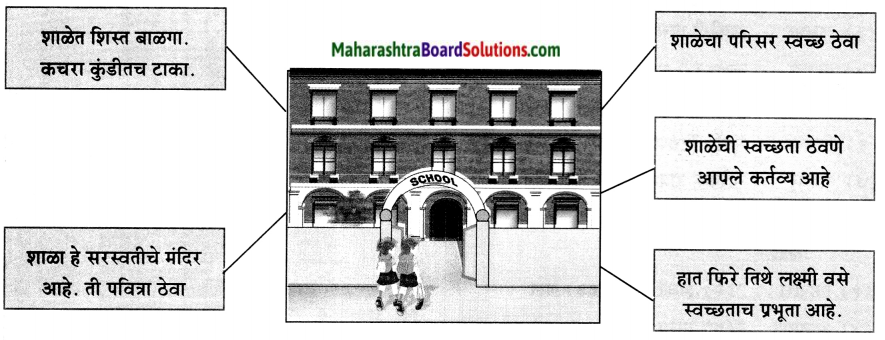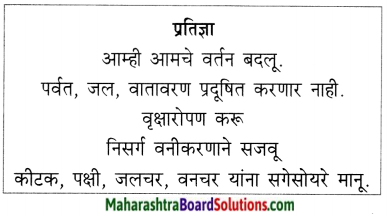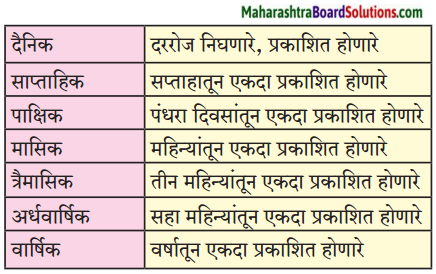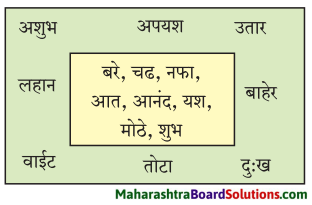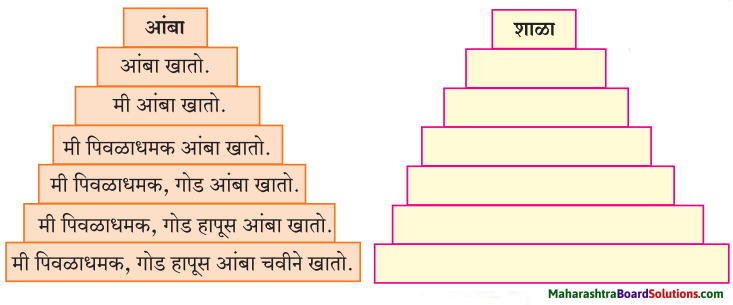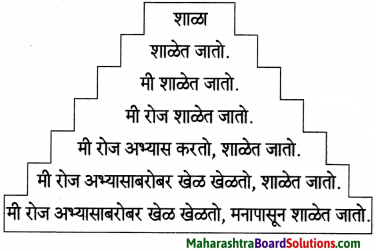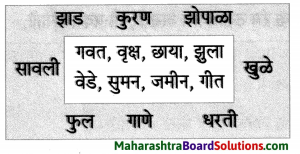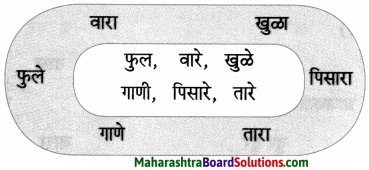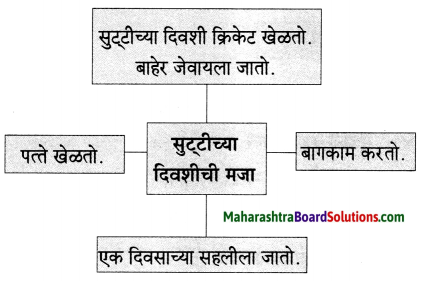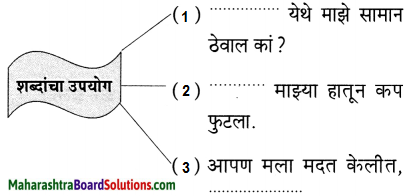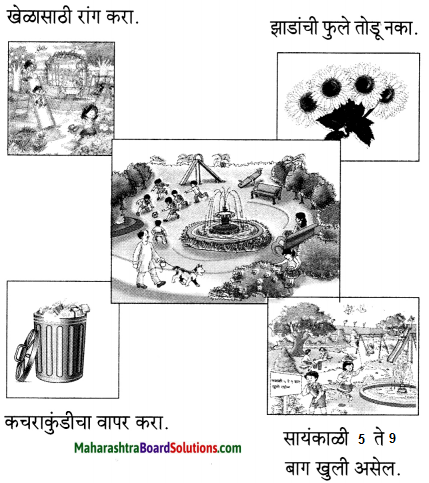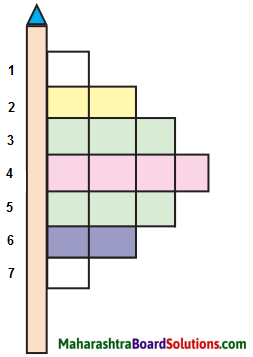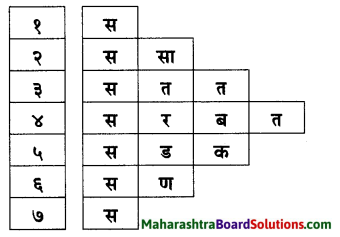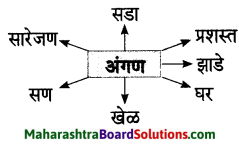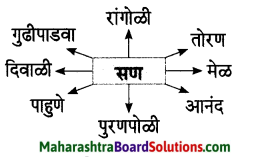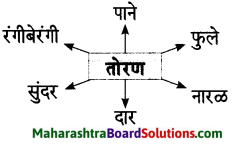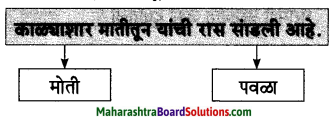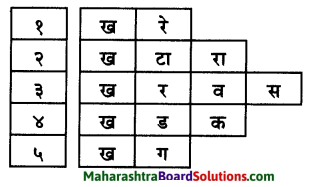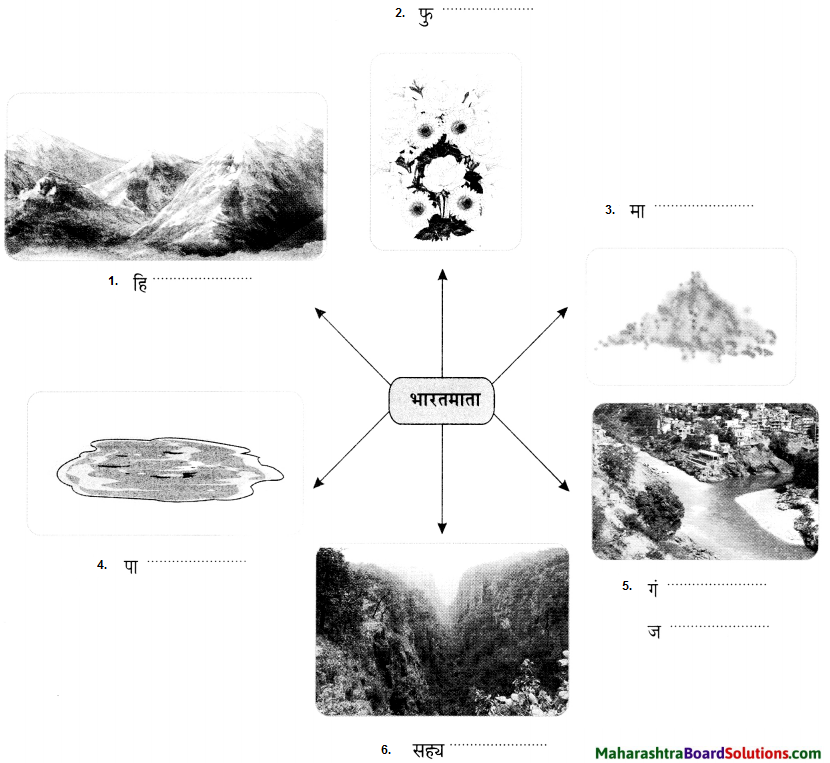Balbharti Maharashtra State Board Class 6 Marathi Solutions Sulabhbharati Chapter 8 कुंदाचे साहस Notes, Textbook Exercise Important Questions and Answers.
Class 6th Marathi Chapter 8 कुंदाचे साहस Question Answer Maharashtra Board
Std 6 Marathi Chapter 8 Question Answer
Marathi Sulabhbharti Class 6 Solutions Chapter 8 कुंदाचे साहस Textbook Questions and Answers
1. दोन-तीन वाक्यांत उत्तरे लिहा.
प्रश्न अ.
झाडे, शेते हिरवीगार कशामुळे झाली होती?
उत्तर:
पावसाळ्याचे दिवस होते, त्यामुळे झाडे, शेते हिरवीगार झाली होती.
![]()
प्रश्न आ.
कुंदा केव्हा पोहायला शिकली होती?
उत्तर:
कुंदा वयाच्या आठव्या वर्षी पोहायला शिकली होती.
प्रश्न इ.
कुंदाला नदीवर कोणते दृश्य दिसले?
उत्तर:
नीलाची ‘धावा! धावा! लवकर या, रझिया पाण्यात पडली’, कुणीतरी वाचवा हो! अशी हाक कानावर पडताक्षणी कुंदा नदीकाठी पोहोचली. आजूबाजूचे लोकही या आवाजाने नदीकडे धावू लागले. मुलींचा गोंधळही वाढू लागला होता. कुंदा नदीच्या काठावर येऊन क्षणभर थांबली. तिला रझिया पाण्यात गटांगळ्या खात त्या पाण्याच्या प्रवाहाबरोबर पुढे पुढे वाहत जात असलेली दिसली.
प्रश्न ई.
नदीच्या काठावरचे लोक कुंदाला कोणत्या सूचना देत होते ?
उत्तर:
‘कुंदा, पाण्याचा वेग वाढतो आहे. मागे फीर’ अशा सूचना नदीच्या काठावरचे लोक कुंदाला देत होते.
प्रश्न उ.
रझियाच्या आईच्या डोळ्यांतून आनंदाश्रू का आले?
उत्तर:
कुंदाने पाण्याच्या वाहत्या प्रवाहात उडी टाकून रझियाला वाचवले होते. त्या दोघीही सुरक्षित असल्याचे पाहून रझियाच्या आईने दोघींना घट्ट मिठी मारली. आपल्या रझियाचे प्राण धाडसामुळे वाचले, या विचाराने मन भरून आल्यामुळे रझियाच्या आईच्या डोळ्यांतून आनंदाश्रू आले.
![]()
2. खालील शब्दांचे विरुद्धार्थी शब्द लिहा.
प्रश्न 1.
खालील शब्दांचे विरुद्धार्थी शब्द लिहा.
(अ) प्रसन्न × ………………
(ई) हसणे × ……………..
(आ) दूरवर × ……………
(उ) पुढे × …………..
(इ) शूर × ………….
(ऊ) लवकर × ………….
उत्तर:
(अ) प्रसन्न × अप्रसन्न
(ई) हसणे × रडणे
(आ) दूरवर × जवळ
(उ) पुढे × मागे
(इ) शूर × घाबरट, भित्रा
(ऊ) लवकर × उशिरा
![]()
3. पोहण्यामध्ये तरबेज असलेल्या व्यक्तीला ‘जलतरणपटू’ म्हणतात. या प्रकारचे खालील शब्द वाचा व त्यांच्या योग्य जोड्या लावा.
प्रश्न 1.
पोहण्यामध्ये तरबेज असलेल्या व्यक्तीला ‘जलतरणपटू’ म्हणतात. या प्रकारचे खालील शब्द वाचा व त्यांच्या योग्य जोड्या लावा.
| ‘अ’ गट | ‘ब’ गट |
| (अ) क्रिकेट खेळण्यात पटाईत | 1. वक्ता |
| (आ) धावण्यात पटाईत | 2. क्रिकेटपटू |
| (इ) भाषण करण्यात पटाईत | 3. धावपटू |
उत्तर:
| ‘अ’ गट | ‘ब’ गट |
| (अ) क्रिकेट खेळण्यात पटाईत | 2. क्रिकेटपटू |
| (आ) धावण्यात पटाईत | 3. धावपटू |
| (इ) भाषण करण्यात पटाईत | 1. वक्ता |
![]()
4. खालील खेळ खेळण्यासाठी आवश्यक असणाऱ्या वस्तू/गोष्टी लिहा.
प्रश्न 1.
खालील खेळ खेळण्यासाठी आवश्यक असणाऱ्या वस्तू/गोष्टी लिहा.
(अ) क्रिकेट –
(आ) कबड्डी –
(इ) फुटबॉल –
(ई) लिंबूचमचा –
(उ) संगीतखुर्ची –
(ऊ) विटीदांडू –
(ए) लगोरी –
(ऐ) पोहणे –
उत्तर:
(अ) क्रिकेट – बॅट
(आ) कबड्डी – मातीचे मैदान, सफेद खडू / पावडर
(इ) फुटबॉल – नेट
(ई) लिंबूचमचा – लिंबू
(उ) संगीतखुर्ची – खुर्ची
(ऊ) विटीदांडू – दांडू
(ए) लगोरी – चिप्प्या
(ऐ) पोहणे – पोहण्याचा पोशाख, टोपी, पोहण्याचा चष्मा
5. कंसातील वाक्प्रचार दिलेल्या वाक्यांत योग्य ठिकाणी वापरा.
(दंग होणे, गलका वाढणे.)
प्रश्न अ.
शाळेची सुट्टी झाल्याबरोबर शाळेच्या मैदानात विदयार्थ्यांचा ………. वाढला.
उत्तरः
गलका वाढला
प्रश्न आ.
परीक्षा असल्यामुळे मुले अभ्यासात ………….. झाली.
उत्तर:
दंग झाली.
![]()
6. आंतरजालाचा उपयोग करून भारतीय जलतरणपटू यांची माहिती घ्या. प्रत्येक खेळाडूची माहिती चार-पाच वाक्यांत लिहा.
प्रश्न 1.
आंतरजालाचा उपयोग करून भारतीय जलतरणपटू यांची माहिती घ्या. प्रत्येक खेळाडूची माहिती चार-पाच वाक्यांत लिहा.
उत्तर:
1. सेबेस्टियन झेविअर (Sebastian Xavier) – यांचा जन्म 10 फेब्रुवारी 1970 रोजी केरळ मध्ये झाला. 50 मीटर फ्री स्टाईल स्विमिंगमध्ये त्यांनी 22.89 सेकंदाचे राष्ट्रीय रेकॉर्ड जवळ जवळ अकरा वर्षे केले. त्यांनी दक्षिण आशियाई खेळात (SAF) 36 सुवर्णपदके मिळवली. 2001 मध्ये त्यांना खेळाच्या क्षेत्रातील सर्वोत्कृष्ट अर्जुन पुरस्काराने सन्मानित केले. त्यांच्या जन्म मनामईल (Manamayil) कुटुंबात केरळ राज्यातील ‘अलाप्पुझा’ (Alappuzha) जिल्हयात ‘इड्थूवा’ (Edathua) या ठिकाणी झाला.
त्यांचे माध्यमिक पर्यंतचे शिक्षण सेन्ट अॅलोसीयस (St. Aloysius) माध्यमिक शाळेत झाले. त्यांचे कॉलेजचे शिक्षण सेन्ट अॅलोसीयस (St. Aloysius) मध्ये झाले. त्याचवेळी त्यांनी वरिष्ठ जलतरणपटू म्हणून तयारी केली. तसेच लाईम लाईट (Lime light) खेळात कौशल्य दाखवले. नंतर ते भारतीय रेल्वेमध्ये राष्ट्रीय व आंतरराष्ट्रीय पातळीवर खेळू लागले. नंतर त्यांनी भारतीय अॅथलेटिक ‘मॉली चॉको’ (Molly Chacko) बरोबर लग्न केले. त्यानंतर ते दोघेही दक्षिण रेल्वे मध्ये काम करू लागले.
2. अंकुर पसेरीयाः (Ankur Paseria) यांचा जन्म 16 मार्च 1977 मध्ये झाला. ते भारतीय अमेरिकन जलतरणपटू आहेत. त्यांनी विशेष प्राविण्य बटरफ्लाय (butterfly events) या प्रकारात मिळवले आहे. 100 मीटर बटरफ्लाय या पोहण्याच्या प्रकारात त्यांनी रेकॉर्ड केले आहे. जपान येथे टोकियोमध्ये झालेल्या आशियाई खेळात त्यांच्याबरोबरच असलेला जलतरणपटू ‘वीरधवल खाडे’ याचे रेकॉर्ड ब्रेक केले. कॅलिफोर्नियाच्या ‘लॉस एन्जिल’ विदयापिठाची पदवी त्यांनी प्राप्त केली आहे. ते एक अष्टपैलू जलतरणपटू आहेत.
3. वीरधवल खाडे: मुळात कोल्हापूरचा असलेल्या खाडेने वयाच्या दहाव्या वर्षी पोहायला सुरूवात केली आणि तेव्हापासून त्याने खूप दूरवरचा पल्ला गाठला आहे. या सहा फूट उंचीच्या धिप्पाड मुलाला पोहण्याचे प्रशिक्षण ‘निहार अमीन’ यांनी दिले आहे. वीरधवल खाडे याने त्याच्या वयोगटात जगातील सर्वात वेगवान जलतरणपटू (पोहणारा) असा लौकिक मिळवला आहे.
आशियाई क्रीडास्पर्धांत पुरूषांच्या 50 मीटर बटरफ्लाय (थोड्या अंतराची वेगवान शर्यत) जलतरण स्पर्धेत कांस्यपदक पटकावून इतिहास घडवला आहे. खजान सिंगने 1986 च्या क्रीडास्पर्धांत मिळवलेल्या रौप्य पदकानंतर आशियाई क्रीडास्पर्धात पदक जिंकणारा वीरधवल हा पहिला भारतीय होता.
त्याने 50 मीटर, 100 मीटर, 200 मीटर आणि 400 मीटर फ्री स्टाइल (मुक्त शैली) जलतरण स्पर्धेत आणि 50 मीटर बटरफ्लाय स्पर्धेत अनेक विक्रम केले आहेत. ऑलिम्पिक क्रीडास्पर्धांत पात्रता मिळवणारा आतापर्यंतचा सर्वात तरूण भारतीय जलतरणपटू असा त्याचा लौकिक आहे.
4. समशेर खान – 1956 मध्ये झालेल्या ऑलिम्पिक स्पर्धेत पोहण्याच्या शर्यतीत उतरणारे समशेर खान हे प्रथम भारतीय जलतरणपटू आहेत. 1956 मध्ये मेलबर्न येथे झालेल्या पोहण्याच्या शर्यतीत ते पाचव्या क्रमांकावर विजयी झाले होते. 1955 मध्ये बँगलोर येथे झालेल्या राष्ट्रीय स्पर्धेत त्यांनी 200 मीटर बटरफ्लाय या कौशल्यात सर्वांचे विक्रम मोडीत काढले.
समशेर खान हे भारतीय संरक्षक दलात कामाला होते. ते 1962 च्या भारत-चीन युद्धात तसेच 1971 च्या भारत – पाकिस्तान च्या युद्धात सहभागी झाले होते. 1973 मध्ये ते ‘सुबेदार’ या पदावर असताना निवृत्त झाले.
![]()
7. तुम्ही रझियाचे ‘हितचिंतक’ आहात, या नात्याने तिला कोणत्या सूचना दयाल?
प्रश्न 1.
तुम्ही रझियाचे ‘हितचिंतक’ आहात, या नात्याने तिला कोणत्या सूचना दयाल?
उत्तरः
- रझियाने नदीच्या किनारी सावधानतेने खेळले पाहिजे होते.
- रझियाने पोहायला शिकले पाहिजे.
- रझियाने कोणत्याही प्रसंगात घाबरू नये.
- रझियाने कुंदाचे आभार मानायला पाहिजेत.
8. पाठ वाचून तुम्हाला कुंदाचे कोणकोणते गुण जाणवले ते लिहा.
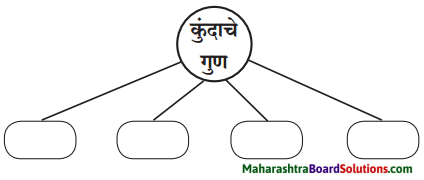
प्रश्न 1.
पाठ वाचून तुम्हाला कुंदाचे कोणकोणते गुण जाणवले ते लिहा.

उत्तर:
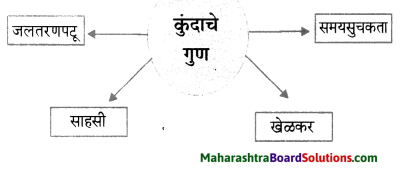
विशेषण – उदा. समीर हुशार मुलगा आहे.
या वाक्यात ‘हुशार’ हा शब्द ‘मुलगा’ या नामाविषयी विशेष माहिती सांगतो. नामाविषयी विशेष माहिती सांगणाऱ्या शब्दाला ‘विशेषण’, म्हणतात; म्हणून ‘हुशार’ हा शब्द ‘विशेषण’ आहे.
![]()
9. कुंदाचे अभिनंदन करणारा कोणता संदेश तुम्ही भ्रमणध्वनीवरून पाठवाल ते खालील चौकोनात लिहा.

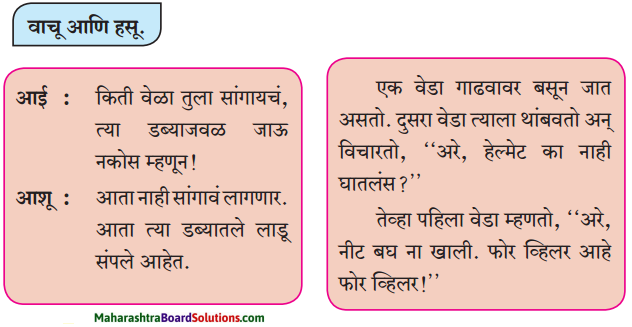
आपण समजून घेऊया.
खालील शब्दसमूह वाचा.
सुंदर फुले, गोड आंबा, उंच डोंगर, ताजे दूध, पिवळा झेंडू, सात केळी, लांब नदी, अवखळ मुले.
वरील शब्दसमूहात फुले, आंबा, डोंगर, दूध, झेंडू, केळी, नदी, मुले ही नामे आहेत, तर सुंदर, गोड, उंच, ताजे, पिवळा, सात, लांब, अवखळ हे शब्द त्या नामांबद्दल विशेष माहिती सांगणारे शब्द आहेत. अशा शब्दांना विशेषण म्हणतात.
खालील आकृतीत गुलाबाच्या फुलाला आठ विशेषणे लावली आहेत. ती समजून घ्या.
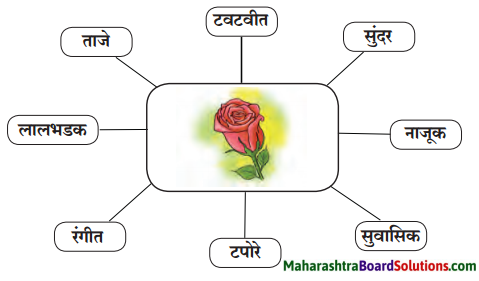
खालील चित्राला दोन-दोन विशेषणे लावा.
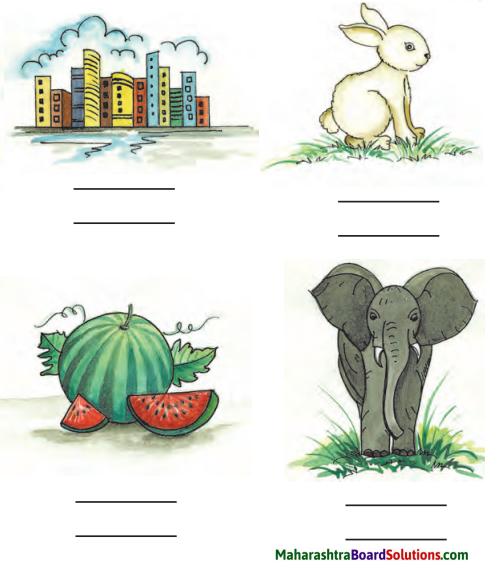
खालील वाक्ये वाचा.
(अ) अरेरे! तू पडलास.
(आ) शाबास! छान खेळलास.
(इ) अरे वाह! छान कपडे आहेत.
उत्कट भावना व्यक्त करताना ती दाखवणाऱ्या शब्दांच्या शेवटी !’ असे चिन्ह देतात. या चिन्हास उद्गारचिन्ह म्हणतात.
प्रश्न 1.
कुंदाचे अभिनंदन करणारा कोणता संदेश तुम्ही भ्रमणध्वनीवरून पाठवाल ते खालील चौकोनात लिहा.
उत्तर:
‘कुंदा तुझे खूप खूप अभिनंदन ! तुझे साहस बघून मला खूप अभिमान वाटला. अशाच साहसी मुलींची आज भारत देशाला गरज आहे. तुझ्या साहसाने आम्हां मुलींना खूप स्फूर्ती मिळाली आहे.’
![]()
प्रश्न 2.
खालील आकृतीत गुलाबाच्या फुलाला आठ विशेषणे लावली आहेत. ती समजून घ्या.
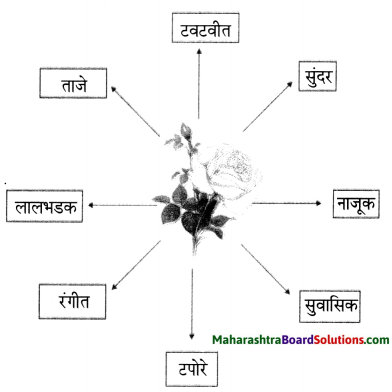
उत्तर:
- टवटवीत गुलाब
- सुंदर गुलाब
- नाजूक गुलाब
- सुवासिक गुलाब
- टपोरे गुलाब
- रंगीत गुलाब
- लालभडक गुलाब
- ताजे गुलाब
![]()
प्रश्न 3.
खालील चित्रांना दोन-दोन विशेषणे लावून लिहा.
उत्तर:
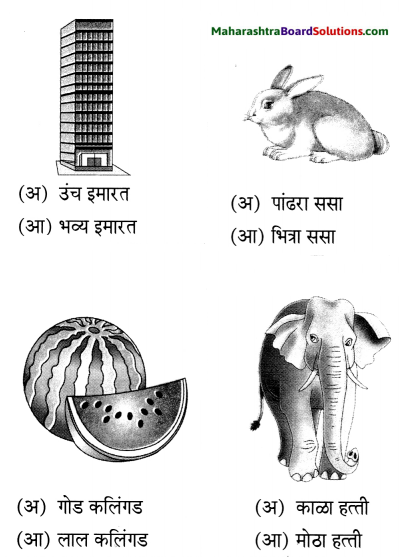
प्रश्न 4.
खालील वाक्ये वाचा.
(अ) अरेरे! तू पडलास.
(आ) शाबास! छान खेळलास.
(इ) अरे वाह! छान कपडे आहेत.
उत्तर:
(अ) अरेरे! फार वाईट झाले!
(आ) बापरे ! केवढा हा साप!
(इ) ओह! किती सुंदर!
![]()
Marathi Sulabhbharti Class 6 Solutions Chapter 8 कुंदाचे साहस Important Additional Questions and Answers
खाली दिलेल्या वाक्यातील रिकाम्या जागी योग्य शब्द भरून वाक्य लिहा.
प्रश्न 1.
- सर्वत्र प्रसन्न …………………. होते.
- पावसामुळे नदीचा …………………. वाढत होता.
- पाहता पाहता ती पट्टीची …………………. बनली होती.
- दूरवर शेतात शेतकरी व काही बायका कामात …………………. होत्या.
- कुंदा धावत येऊन काठावर उभी …………………. राहिली.
- कुंदाला फक्त …………………. दिसत होती.
- ही बातमी …………………. पसरली.
- कौतुकाने व अभिमानाने त्यांनी मुलीला …………………. घेतले.
- आज साऱ्या गावात कुंदाच्या ………………….. चर्चा होती.
- साऱ्यांच्या कौतुकाच्या …………………. कुंदा आनंदून गेली.
उत्तर:
- वातावरण
- प्रवाह
- जलतरणपटू
- मग्न
- क्षणभर
- रझिया
- गावभर
- जवळ
- साहसाचीच
- वर्षावाने
![]()
खालील प्रश्नांची प्रत्येकी एका वाक्यात उत्तरे लिहा.
प्रश्न 1.
गावातील नदीचे नाव काय आहे?
उत्तर:
गावातील नदीचे नाव ‘सोना’ हे आहे.
प्रश्न 2.
कोणत्या दिवशी शाळेला सुट्टी होती?
उत्तर:
‘रविवार’ या दिवशी शाळेला सुट्टी होती.
प्रश्न 3.
कुंदा व तिच्या मैत्रिणी कुठे खेळायला गेल्या होत्या?
उत्तर:
कुंदा व तिच्या मैत्रिणी नदीच्या काठावर खेळायला गेल्या होत्या.
प्रश्न 4.
कुंदा वयाच्या कितव्या वर्षी पोहायला शिकली होती?
उत्तर:
कुंदा वयाच्या आठव्या वर्षी पोहायला शिकली होती.
![]()
प्रश्न 5.
दूरवर शेतात कोण-कोण कामात मग्न होते?
उत्तर:
दूरवर शेतात शेतकरी व काही बायका कामात मग्न होत्या.
प्रश्न 6.
पाण्यात कोण पडली होती?
उत्तर:
रझिया पाण्यात पडली होती.
प्रश्न 7.
रझियाला पाण्यातून वाचवण्यासाठी पाण्यात कोणी उडी घेतली?
उत्तर:
रझियाला पाण्यातून वाचवण्यासाठी पाण्यात कुंदाने उडी घेतली.
प्रश्न 8.
कुंदाने रझियाला कुठे आणले?
उत्तर:
कुंदाने रझियाला काठाकडे आणले.
प्रश्न 9.
कौतुकाने व अभिमानाने कुंदाला कोणी जवळ घेतले?
उत्तरः
कौतुकाने व अभिमानाने कुंदाला तिच्या आई-बाबांनी जवळ घेतले.
![]()
असे कोण कोणास म्हणाले ते लिहा.
प्रश्न 1.
“धावा! धावा! लवकर या, रझिया पाण्यात पडली.”
उत्तर:
नीला आजूबाजूच्या लोकांना म्हणाली.
प्रश्न 2.
“कुंदा, पाण्याचा वेग वाढतो आहे. माघारी फिर.”
उत्तर:
जमलेली माणसे कुंदाला म्हणत होती.
![]()
प्रश्न 3.
“रझिया घाबरू नको, मी आले आहे.”
उत्तर:
कुंदा रझियाला म्हणाली.
प्रश्न 4.
“कुंदा, आज तुझ्यामुळेच माझ्या रझियाचा जीव वाचला.”
उत्तर:
रझियाची आई कुंदाला म्हणाली.
खालील प्रश्नांची दोन-तीन वाक्यात उत्तरे लिहा.
प्रश्न 1.
पावसाळ्याचे दिवस असल्याने गावात कोणता बदल झाला होता?
उत्तर:
पावसाळ्याचे दिवस असल्याने झाडे, शेते सर्वच हिरवीगार झाली होती. सर्वत्र प्रसन्न वातावरण होते. गावातल्या सोना नदीला भरपूर पाणी आले होते. पावसामुळे नदीचा प्रवाह वाढत होता. हा बदल झाला होता.
प्रश्न 2.
कुंदाला नदीवर कोणते दृश्य दिसले?
उत्तर:
‘रझिया नदीच्या पाण्यात पडली आहे, व तिला वाचवण्यास कुणीतरी मदत करा’ ही नीलाची हाक कुंदाच्या कानावर पडल्याबरोबर ती धावतच नदीकिनारी पोहोचली. ती नदीच्या काठावर येऊन क्षणभर उभी राहिली तेव्हा तिला रझिया पाण्यात गटांगळ्या खात पाण्याच्या प्रवाहाबरोबर पुढे पुढे वाहत चालल्याचे दृश्य दिसले.
![]()
प्रश्न 3.
नदीच्या काठावरचे लोक कुंदाला कोणत्या सूचना देत होते?
उत्तर:
नीलाच्या हाकेमुळे आजूबाजूचे लोकही नदीकिनारी जमले होते. रझियाला वाचवण्यासाठी कुंदाने पाण्यात उडी घेताच लोक जोरजोरात ओरडून ‘कुंदा’ पाण्याचा वेग वाढतो आहे. ‘माघारी फिर’ ही सूचना देत होते.
प्रश्न 4.
कोणती बातमी गावभर पसरली?
उत्तर:
कुंदा आणि तिच्या मैत्रिणी रविवारी शाळेच्या सुट्टीच्या दिवशी नदीच्या काठावर खेळत असताना रझिया पाण्यात पडली व पाण्याच्या प्रवाहाबरोबर गटांगळ्या खात ती बुडू लागली. पण तिला वाचवण्यासाठी कुंदाने पाण्यात उडी घेतली व तिला काठाकडे आणले. तोवर लोकांनी मोठा दोर पाण्यात सोडून दोघींना बाहेर काढले. ही बातमी गावभर पसरली.
प्रश्न 5.
रझियाच्या आईच्या डोळ्यांतून आनंदाश्रू का आले?
उत्तर:
वाहणाऱ्या नदीच्या मोठ्या प्रवाहात गटांगळ्या खात बुडत असणाऱ्या आपल्या मुलीला कुंदाने मोठ्या धाडसाने वाचवले. कुंदामुळेच आज रझियाचा जीव वाचला’ या विचारानेच रझियाच्या आईच्या डोळ्यातून आनंदाश्रू आले.
![]()
व्याकरण व भाषाभ्यास:
खालील शब्दांचे समानार्थी शब्द लिहा.
प्रश्न 1.
- साहस
- सर्वत्र
- मैत्रिण
- मग्न
- लहानगी
- हाक
- पाणी
- बातमी
- सुखरूप
- कवटाळणे
उत्तरः
- धाडस
- सगळीकडे
- सखी
- गर्क, दंग
- छोटी
- आवाज
- जल, उदक
- खबर, माहिती
- सुरक्षित
- मिठी मारणे
![]()
खालील शब्दांचे विरूद्धार्थी शब्द लिहा.
प्रश्न 1.
- दिवस
- भरपूर
- मोठ्या
- बायका
- लहान
उत्तरः
- रात्र
- कमी, थोडे
- छोट्या
- माणसे
- मोठे
खालील शब्दांचे वचन बदला.
प्रश्न 1.
- झाड
- शेत
- सुट्टी
- मैत्रिण
- बाई
- हाक
- दोर
- मिठी
उत्तरः
- झाडे
- शेते
- सुट्ट्या
- मैत्रिणी
- बायका
- हाका
- दोऱ्या
- मिठ्या
![]()
प्रश्न 2.
कंसातील वाक्प्रचार दिलेल्या वाक्यांत योग्य ठिकाणी वापरून वाक्य पुन्हा लिहा.
(दंग होणे, गलका वाढणे, गटांगळ्या खाणे)
1. पोहता न आल्यामुळे जयेश नदीच्या पात्रात ……………… .
उत्तर:
गटांगळ्या खाऊ लागला.
पोहण्यामध्ये तरबेज असलेल्या व्यक्तीला ‘जलतरणपटू’ म्हणतात. या प्रकारचे खालील शब्द वाचा व त्यांच्या योग्य जोड्या लावा.
प्रश्न 1.
| ‘अ’ गट | ‘ब’ गट |
| 1. कुस्ती खेळण्यात पटाईत | (अ) तिरंदाज |
| 2. तीर चालवण्यात पटाईत | (आ) कुस्तीपटू |
उत्तर:
| ‘अ’ गट | ‘ब’ गट |
| 1. कुस्ती खेळण्यात पटाईत | (आ) कुस्तीपटू |
| 2. तीर चालवण्यात पटाईत | (अ) तिरंदाज |
खालील चौकोनातील मुलाच्या चित्राला आठ विशेषणे लावली आहेत ती लिहून काढा.
प्रश्न 1.
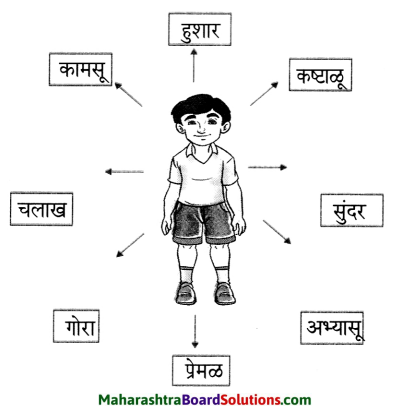
उत्तर:
- हुशार मुलगा
- कष्टाळू मुलगा
- सुंदर मुलगा
- अभ्यासू मुलगा
- प्रेमळ मुलगा
- गोरा मुलगा
- चलाख मुलगा
- कामसू मुलगा
![]()
प्रश्न 2.
खालील चित्रांना दोन-दोन विशेषणे लावून लिहा.
उत्तर:
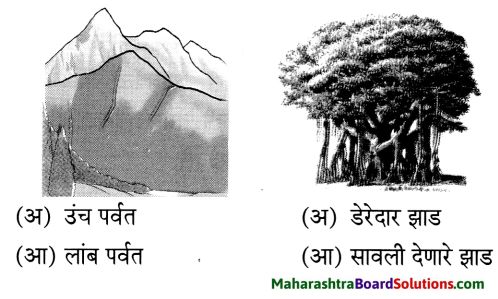
खालील वाक्यांत योग्य ठिकाणी उद्गार (!) चिन्ह त्या.
प्रश्न 1.
धावा धावा लवकर या, रझिया पाण्यात पडली.
उत्तर:
धावा! धावा! लवकर या, रझिया पाण्यात पडली.
प्रश्न 2.
केवढी धाडसी मुलगी आहेस तू.
उत्तर:
केवढी धाडसी मुलगी आहेस तू!
![]()
प्रश्न 3.
शब्बास छान खेळलास.
उत्तर:
शाब्बास! छान खेळलास.
कुंदाचे साहस Summary in Marathi
पाठपरिचय:
‘कुंदाचे साहस’ या पाठात कुंदाने दाखवलेले साहस व तिची समयसुचकता याविषयी वर्णन केले आहे.
शब्दर्थ:
- साहस – धाडस (adventure)
- शेत – रान (farm)
- प्रसन्न – आनंदी (happy)
- वातावरण – भोवतालचा परिसर (surrounding)
- भरपूर – खूप, जास्त (a lot of)
- प्रवाह – पाण्याचा वाहणारा वेग (flow of water)
- काठ – किनारा, तट (bank of river)
- पट्टीची – पोहण्यात तरबेज (swimmer)
- कडूनिंब – एक प्रकारचे लिंबाचे झाड (Neem tree)
- बागडत – इकडे-तिकडे उड्या मारत (fluttering)
- मग्न – गर्क, गुंग, दंग (indulge in)
- लहानगी – छोटी (a little)
- दंग – मग्न (surprised, ongrossed)
- हाक – आरोळी, आवाज (call)
- गलका – गोंधळ (noise)
- क्षणभर – काही वेळ (a moment)
- पात्र – नदीचा वाहता प्रवाह (a bed of river)
- एवढीशी – लहानगी, छोटी (a little)
- वेग – गती (speed)
- माघारी – परत, मागे (retreat)
- तोवर – तोपर्यंत (till then)
- दोर – कासरा, रस्सी (rope)
- सुखरूप – सुरक्षित (safe)
- कवटाळणे – मिठी मारणे (to huy)
![]()
वाकप्रचार व अर्थ:
- मग्न असणे – दंग असणे, गर्क असणे, गुंग असणे
- गावभर पसरणे – सगळीकडे समजणे, पूर्ण गावात माहिती होणे
- गलका वाढणे – गडबड वाढणे, गोंधळ करणे
- गटांगळ्या खाणे – पाण्यात बुडणे
- कोणाचेही शब्द कानावर न पडणे – काहीही ऐकायला न येणे
- आनंदाश्रू वाहणे – आनंदाने डोळ्यातून अश्रू येणे
Marathi Sulabhbharati Class 6 Solutions
- भारतमाता (गाणे) Question Answer
- माझा अनुभव Question Answer
- पाऊस आला! पाऊस आला! (कविता) Question Answer
- माहिती घेऊया Question Answer
- सुगरणीचे घरटे Question Answer
- हे खरे खरे व्हावे… (कविता) Question Answer
- उद्यानात भेटलेला विद्यार्थी Question Answer
- कुंदाचे साहस Question Answer
- घर (कविता) Question Answer
